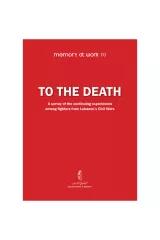To the Death: A survey of the continuing experiences among fighters from Lebanon's Civil Wars
Publication
To the Death: A survey of the continuing experiences among fighters from Lebanon's Civil Wars
Obviously, this one-time fighter was referring to moral responsibility rather than direct participation. But by extension, it may be that this veteran was attempting to broaden the scope of responsibility typically recognized in Lebanon in order to shift the focus then being placed on his involvement in the war and that of his peers. Nevertheless, while some played verbal, moral and even academic roles in the conflict, others gave their very “blood and souls.” They fought To the Death.
The issue concerning those who actually fought Lebanon’s civil war is among the most neglected elements of that conflict. In fact, it has become one of the many considerations commonly overlooked beyond the ad hoc “solution” arrived at concerning the “integration” of a number of militiamen into the army and other governmental bodies. As we progressed with our work on the What is to Be Done? Lebanon’s War-Loaded Memory initiative, we realized that we had no choice but to tackle the issue of former combatants, despite the associated sensitivity and challenges. And while everyone who participated in the discussion sessions certainly made valuable contributions, we are particularly indebted to Assaad Chaftari. Indeed, he was the first person who dared to suggest that a specialized research institution be commissioned to survey the attitudes of former combatants. He viewed such an assessment as being akin to an X-ray with predictive value, a process that would mark the beginning of a focused exploration into the topic.
In response, a poll conducted by Statistics Lebanon Ltd, was commissioned by UMAM Documentation & Research. The results were first publicized in a limited edition work given to the attendees of the fourth workshop of the What is to Be Done? Lebanon’s War-Loaded Memory project, also organized by UMAM D&R. That workshop, A War Without Crime? Amnesties and Prosecution, was held 18-19 October 2008. The second edition of that work has benefited significantly from the comments offered by workshop participants and others who reviewed the original publication.
In terms of study constraints, elements of the Lebanese Armed Forces and members of other military and security bodies were excluded from the assessment. Likewise, the survey did not include the members of Hezbollah/“Islamic Resistance.” Considering those who fought in the Lebanese civil war, the study focused specifically on individuals who engaged in active military service during the period April 13, 1975 to October 13, 1990. The sample population was comprised of even numbers of combatants from both “camps” in the conflict, irrespective of the name changes and control shifts that occurred within each. The poll took place from early September to early October 2008.
As E. Atallah observed, participation in the war “was never an issue.” Yet no history of this devastating conflict can ever be complete if it fails to explain why ordinary Lebanese chose to fight and how they perceive the actions they took during the war. With that in mind, this work has attempted to identify and elucidate some of the many factors that compelled Lebanese to enter the fray. Yet while we hope this study has achieved that end, we also believe that it should be evaluated only with regard to how well it has accomplished that specific goal.
Email: info@umam-dr.org
Telephone: +961(0)1273881
Telephone/Fax: +961(0)1553604
The poll, the results and analysis of which are published in this book, was funded by the Heinrich Böll Foundation Middle East.
